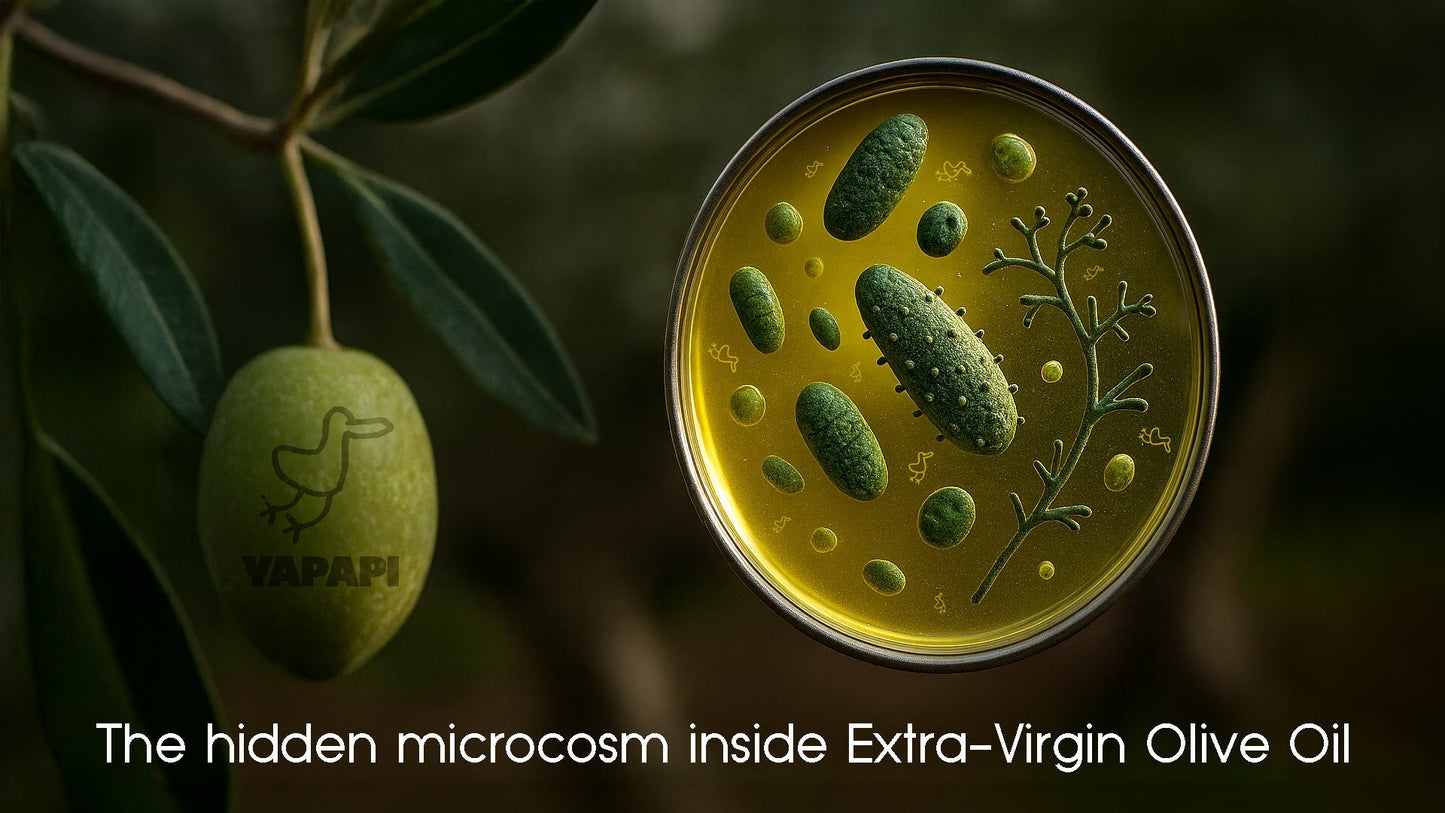
Olive oil is more than a simple kitchen staple—it’s a living product full of chemistry, culture, and even tiny microorganisms that play a big role in taste and freshness. Among them, natural yeasts are the hidden forces shaping the flavor profile, aroma, and even the nutritional value of extra virgin olive oil.
The Hidden Microcosm Inside Extra Virgin Olive Oil
Every drop of EVOO is a micro-universe. Alongside antioxidants and healthy fats, there’s a community of microorganisms—mostly yeasts—that can work wonders for your oil… or lead to quality defects if not handled carefully. Understanding them is key for olive oil producers and consumers who want to enjoy top-grade oil.
The “Good” Microorganisms: Flavor Enhancers
Some natural yeasts are like friendly chefs in your bottle:
- Reducing bitterness: By breaking down natural compounds like oleuropein, they give the oil a smoother, more balanced taste.
- Boosting aroma: They help release sweet, fruity, and floral notes that define high-quality olive oil.
- Adding nutritional benefits: Certain yeast strains may even offer probiotic properties, contributing to the oil’s health appeal.
The “Bad” Microorganisms: Quality Threats
When olive oil storage conditions or harvest practices aren’t ideal, other microorganisms can develop and cause:
- Increased acidity, which reduces the oil’s grade and market value.
- Off-flavors and rancid odors, masking the fresh olive fruitiness.
- Color degradation and loss of freshness over time.
Key Factors That Control Microorganisms in Olive Oil
- Fruit quality – Healthy, freshly harvested olives promote beneficial microorganisms, while damaged fruit invites spoilage yeasts.
- Phenolic content – Natural antioxidants act as antimicrobial agents, protecting the oil’s sensory profile.
- Storage environment – Cool temperatures, stainless-steel tanks, and protection from light help maintain extra virgin quality.
How We Do It at Yapapi
At Yapapi Olive Oil, our process is designed to protect the good microorganisms while eliminating the harmful ones:
- Harvesting olives at peak ripeness.
- Selecting only flawless fruit to avoid early fermentation.
- Using optimal storage—cool, dark, and sealed—to preserve both flavor and freshness.
Why Microorganisms Matter for Olive Oil Lovers
Microorganisms may be invisible, but they are essential to the flavor, aroma, and shelf life of olive oil. They are the silent “chefs” deciding whether your oil will sing with freshness or fall flat. By respecting nature’s microbiology, we deliver an olive oil that’s authentic, vibrant, and rich in character—from our groves to your table.
[Ελληνικά]
Ο ρόλος των μικροοργανισμών στο ελαιόλαδο: Οι αθέατοι «σεφ» της γεύσης
Ένας μικρόκοσμος μέσα σε κάθε σταγόνα
Το ελαιόλαδο δεν είναι απλώς χυμός ελιάς. Είναι ένας ζωντανός μικρόκοσμος, όπου –εκτός από τα πολύτιμα θρεπτικά στοιχεία– ζουν και μικροσκοπικοί οργανισμοί, κυρίως ζύμες. Αυτοί οι αόρατοι «κάτοικοι» μπορούν να κάνουν το λάδι μας υπέροχο… ή να του χαλάσουν τη διάθεση.
Οι καλοί μικροοργανισμοί
Κάποιες ζύμες δουλεύουν για εμάς:
- Μαλακώνουν την πικράδα: Διασπούν φυσικές ουσίες όπως η ελευροπαΐνη, κάνοντας τη γεύση πιο απαλή.
- Φτιάχνουν αρώματα: Δημιουργούν γλυκές και φρουτώδεις νότες που κάνουν το λάδι πιο αρωματικό.
- Προσφέρουν διατροφική αξία: Ορισμένες έχουν και προβιοτικά χαρακτηριστικά, ενισχύοντας τα οφέλη για την υγεία.
Οι… όχι και τόσο καλοί
Αν οι συνθήκες δεν είναι ιδανικές, άλλες ζύμες μπορεί να:
- Αυξήσουν την οξύτητα και να χαλάσουν την ισορροπία της γεύσης.
- Δημιουργήσουν δυσάρεστες μυρωδιές, σαν «μπαγιασμένο» λάδι.
- Αποχρωματίσουν και υποβαθμίσουν την ποιότητα με τον καιρό.
Από πού εξαρτάται η δράση τους;
- Η ποιότητα του καρπού: Υγιείς, φρέσκες ελιές σημαίνουν πιο «καλοί» μικροοργανισμοί.
- Η περιεκτικότητα σε πολυφαινόλες: Δρουν σαν φυσική ασπίδα απέναντι στους ανεπιθύμητους μικροοργανισμούς.
- Η αποθήκευση: Σκοτάδι, δροσιά και καθαρά δοχεία διατηρούν την ισορροπία και τη φρεσκάδα.
Τι κάνουμε στο Yapapi
Στο Yapapi, η φροντίδα ξεκινάει από το δέντρο και φτάνει μέχρι το μπουκάλι:
- Μαζεύουμε τις ελιές στην ιδανική στιγμή.
- Διαλέγουμε μόνο υγιείς καρπούς.
- Αποθηκεύουμε το λάδι μας με τρόπο που κρατά τους «καλούς» μικροοργανισμούς και διώχνει τους «κακούς».
Συμπέρασμα
Οι μικροοργανισμοί μπορεί να είναι αόρατοι, αλλά η επίδρασή τους είναι μεγάλη. Είναι οι αθόρυβοι «σεφ» που καθορίζουν αν το λάδι θα έχει υπέροχο άρωμα και γεύση ή αν θα χάσει τον χαρακτήρα του. Με σωστή φροντίδα και γνώση, φέρνουμε στο τραπέζι σας ένα ελαιόλαδο αυθεντικό, ζωντανό και μοναδικό.
